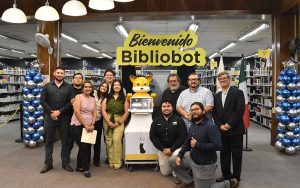Mexicali, Baja California — In a bold step toward merging artificial intelligence with academic support services, CETYS Universidad has unveiled “Bibliobot,” the first autonomous robot designed to assist with library information queries. Developed by faculty and students from the School of Engineering at CETYS through the Centro de Excelencia en Innovación y Diseño (CEID), the AI-powered assistant aims to guide students and professors through the library’s resources with accuracy, autonomy, and technological flair.
The unveiling took place on June 17, 2025, at CETYS Universidad’s Mexicali campus, drawing an audience of academic leaders, media representatives, and students who witnessed a live demonstration of Bibliobot’s capabilities.
“What is Bibliobot?” posed Dr. Mario Dipp Núñez, Director of the Mexicali campus, during the presentation. “It is essentially the manifestation of knowledge access—what a library offers—brought to life through technology. Our goal is that it becomes a useful tool, one that guides and orients users toward the information they need.”
Bibliobot doesn’t just symbolize innovation—it functions as it. The robot is equipped with a search interface powered by artificial intelligence, capable of interpreting user questions and recommending appropriate books or academic resources from CETYS’ extensive library database. Its sleek design and user-friendly interaction are only part of its futuristic appeal.
Unlike many institutions that purchase off-the-shelf tech, CETYS has taken a step forward in developing its own. “We’re convinced that this isn’t just a breakthrough for our library system—it’s good news for all of Mexico,” said Dr. Daniel Sanabria Barrios, CETYS’ State Director of Libraries. “This is technology deployed, adapted, and designed by our own professors, researchers, and students. We are no longer just consumers of innovation; we are now creators.”
This homegrown approach highlights CETYS’ commitment to empowering its academic community with the skills and opportunities to build real-world solutions. According to project leader Mtro. Gerardo Tamai Marruffo, the engineering team integrated various advanced features into Bibliobot, including a 2D LIDAR sensor that allows the robot to navigate autonomously through the library while detecting nearby individuals to ensure safe and efficient interaction.
While Bibliobot is still in its initial stage of development, it’s already proving to be a game-changer. The robot’s interface allows users to ask natural language questions—such as “Where can I find books on renewable energy?”—and instantly receive relevant results and locations from the digital catalog. This capability represents a significant leap from traditional catalog terminals, blending conversational AI with real-time resource accessibility.
The integration of AI into such a public-facing academic environment is not just about convenience; it’s also about preparing the next generation of engineers and researchers to engage with the digital transformation shaping global industries.
The project was presented in the presence of CETYS leadership, including Dr. Verónica Rojas Mendizábal, Director of CEID; Dr. Alberto Gárate Rivera, CETYS’ Academic Vice Rector; and Dr. Mario Dipp Núñez. Their joint remarks emphasized that Bibliobot is just one of many initiatives CETYS is undertaking to align higher education with the challenges and opportunities of the Fourth Industrial Revolution.
“This is not only a milestone in CETYS’ digital evolution,” Dr. Gárate said, “but a clear statement about the kind of professionals we aim to form—innovative, capable, and future-ready.”
As Bibliobot continues to evolve through feedback and iterative design, CETYS is positioning itself at the forefront of academic innovation in Mexico and Latin America. It’s a tangible example of how technology, when purposefully implemented, can elevate education while preserving its most human goals: access to knowledge, curiosity, and lifelong learning.



